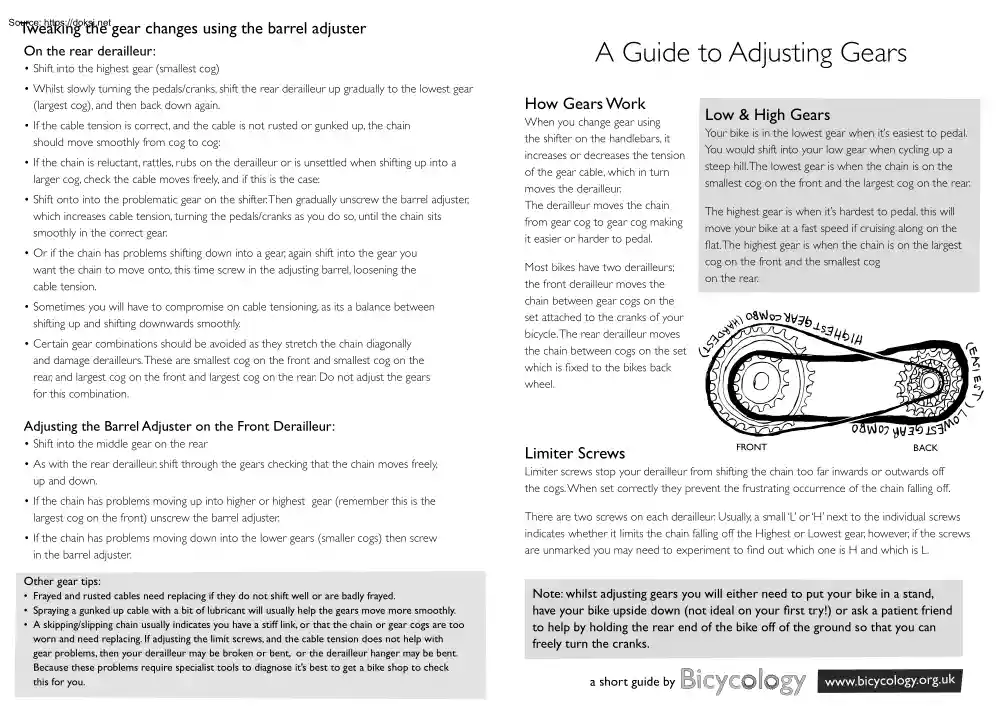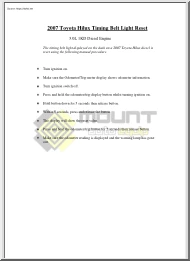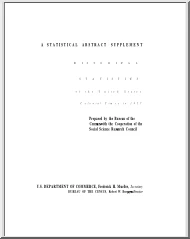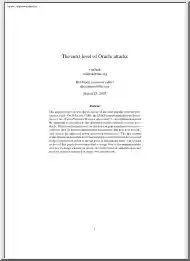A doksi online olvasásához kérlek jelentkezz be!

A doksi online olvasásához kérlek jelentkezz be!
Nincs még értékelés. Legyél Te az első!
Mit olvastak a többiek, ha ezzel végeztek?
Tartalmi kivonat
Tweaking the gear changes using the barrel adjuster On the rear derailleur: • Shift into the highest gear (smallest cog) • Whilst slowly turning the pedals/cranks, shift the rear derailleur up gradually to the lowest gear (largest cog), and then back down again. • If the cable tension is correct, and the cable is not rusted or gunked up, the chain should move smoothly from cog to cog: • If the chain is reluctant, rattles, rubs on the derailleur or is unsettled when shifting up into a larger cog, check the cable moves freely, and if this is the case: • Shift onto into the problematic gear on the shifter. Then gradually unscrew the barrel adjuster, which increases cable tension, turning the pedals/cranks as you do so, until the chain sits smoothly in the correct gear. • Or if the chain has problems shifting down into a gear, again shift into the gear you want the chain to move onto, this time screw in the adjusting barrel, loosening the cable tension. • Sometimes you will
have to compromise on cable tensioning, as its a balance between shifting up and shifting downwards smoothly. • Certain gear combinations should be avoided as they stretch the chain diagonally and damage derailleurs. These are smallest cog on the front and smallest cog on the rear, and largest cog on the front and largest cog on the rear. Do not adjust the gears for this combination. A Guide to Adjusting Gears How Gears Work When you change gear using the shifter on the handlebars, it increases or decreases the tension of the gear cable, which in turn moves the derailleur. The derailleur moves the chain from gear cog to gear cog making it easier or harder to pedal. Most bikes have two derailleurs; the front derailleur moves the chain between gear cogs on the set attached to the cranks of your bicycle. The rear derailleur moves the chain between cogs on the set which is fixed to the bikes back wheel. Low & High Gears Your bike is in the lowest gear when it’s easiest to pedal.
You would shift into your low gear when cycling up a steep hill. The lowest gear is when the chain is on the smallest cog on the front and the largest cog on the rear. The highest gear is when it’s hardest to pedal, this will move your bike at a fast speed if cruising along on the flat. The highest gear is when the chain is on the largest cog on the front and the smallest cog on the rear. Adjusting the Barrel Adjuster on the Front Derailleur: • Shift into the middle gear on the rear • As with the rear derailleur, shift through the gears checking that the chain moves freely, up and down. • If the chain has problems moving up into higher or highest gear (remember this is the largest cog on the front) unscrew the barrel adjuster. • If the chain has problems moving down into the lower gears (smaller cogs) then screw in the barrel adjuster. Other gear tips: • Frayed and rusted cables need replacing if they do not shift well or are badly frayed. • Spraying a gunked up cable
with a bit of lubricant will usually help the gears move more smoothly. • A skipping/slipping chain usually indicates you have a stiff link, or that the chain or gear cogs are too worn and need replacing. If adjusting the limit screws, and the cable tension does not help with gear problems, then your derailleur may be broken or bent, or the derailleur hanger may be bent. Because these problems require specialist tools to diagnose it’s best to get a bike shop to check this for you. Limiter Screws FRONT BACK Limiter screws stop your derailleur from shifting the chain too far inwards or outwards off the cogs. When set correctly they prevent the frustrating occurrence of the chain falling off There are two screws on each derailleur. Usually, a small ‘L’ or ‘H’ next to the individual screws indicates whether it limits the chain falling off the Highest or Lowest gear, however, if the screws are unmarked you may need to experiment to find out which one is H and which is L.
Note: whilst adjusting gears you will either need to put your bike in a stand, have your bike upside down (not ideal on your first try!) or ask a patient friend to help by holding the rear end of the bike off of the ground so that you can freely turn the cranks. a short guide by Setting The Limiter Screws Adjusting Gear Cable Tension .On the Rear Derailleur: High Gear • Locate the limit screws: these are usually on the back of the derailleur • Shift the chain into the highest gear (smallest cog) • Gradually tighten the high gear limiter screw (marked ‘H’) whilst gently turning the pedals/cranks until the chain moves onto the second highest cog (second smallest cog). • Then, whilst still turning the pedals/ cranks gently, back out the limiter screw a quarter turn at a time until the point when the derailleur is able to move the chain into the smallest cog once again. • Shift up and down between the smallest and second smallest cog a few times to check that it shifts
smoothly and that the chain doesn’t rub. You may need to tweak the limit screw a bit to get the best shifting. Low Gear • Shift into the lowest gear (largest cog) • Turn the pedals/cranks as described before • Tighten the low gear screw (marked L) until the chain falls onto the second largest cog. • Back out the low gear screw until it will shift into the lowest gear, and test shift back and forth as with the H screw. ferrule barrel adjuster (high & low) (high & low) cable fixing bolt Before you adjust cable tension, ensure the limiter screws are set correctly as described on previous pages. front derailleur gear cable gear cogset limiter screws limiter screws rear derailleur cable fixing bolt The gear cables run from the shifters on each of the handlebars to the front and rear derailleurs. Adjust the cable tension if the chain has difficulty shifting between gears. upper jockey wheel lower jockey wheel Adjust the gear cable tension at the cable fixing
bolt: • Shift the chain into the lowest gear combination. .On the Front Derailleur: Use the same technique as described in adjusting the rear derailleur, only remember with the front gear cogs, the highest gear (adjusted by the H screw) is the largest cog, and that the lowest gear (adjusted by the L screw) is the smallest cog. cranks • Follow the gear cable from the shifter to the derailleur, check the cable’s tension on the exposed section of inner cable • The cable should ideally be tensioned but not overly tight. It should not be baggy • If the cable is not correctly tensioned, loosen the cable fixing bolt (see diagrams for where this is located on each derailleur) • Pull the cable taught, but not tight. • Re-fasten the bolt. Things to look out for: If the bike will not shift into the highest or lowest gear despite the limit screws being unscrewed all of the way, the cable tension may be to blame. gear barrel adjuster Barrel Adjusters Gear barrel adjusters are
handily positioned on the handlebars so that the gear tension can be tweaked whilst riding along. With the rear derailleur there will often be a second barrel adjuster on the derailleur body itself
have to compromise on cable tensioning, as its a balance between shifting up and shifting downwards smoothly. • Certain gear combinations should be avoided as they stretch the chain diagonally and damage derailleurs. These are smallest cog on the front and smallest cog on the rear, and largest cog on the front and largest cog on the rear. Do not adjust the gears for this combination. A Guide to Adjusting Gears How Gears Work When you change gear using the shifter on the handlebars, it increases or decreases the tension of the gear cable, which in turn moves the derailleur. The derailleur moves the chain from gear cog to gear cog making it easier or harder to pedal. Most bikes have two derailleurs; the front derailleur moves the chain between gear cogs on the set attached to the cranks of your bicycle. The rear derailleur moves the chain between cogs on the set which is fixed to the bikes back wheel. Low & High Gears Your bike is in the lowest gear when it’s easiest to pedal.
You would shift into your low gear when cycling up a steep hill. The lowest gear is when the chain is on the smallest cog on the front and the largest cog on the rear. The highest gear is when it’s hardest to pedal, this will move your bike at a fast speed if cruising along on the flat. The highest gear is when the chain is on the largest cog on the front and the smallest cog on the rear. Adjusting the Barrel Adjuster on the Front Derailleur: • Shift into the middle gear on the rear • As with the rear derailleur, shift through the gears checking that the chain moves freely, up and down. • If the chain has problems moving up into higher or highest gear (remember this is the largest cog on the front) unscrew the barrel adjuster. • If the chain has problems moving down into the lower gears (smaller cogs) then screw in the barrel adjuster. Other gear tips: • Frayed and rusted cables need replacing if they do not shift well or are badly frayed. • Spraying a gunked up cable
with a bit of lubricant will usually help the gears move more smoothly. • A skipping/slipping chain usually indicates you have a stiff link, or that the chain or gear cogs are too worn and need replacing. If adjusting the limit screws, and the cable tension does not help with gear problems, then your derailleur may be broken or bent, or the derailleur hanger may be bent. Because these problems require specialist tools to diagnose it’s best to get a bike shop to check this for you. Limiter Screws FRONT BACK Limiter screws stop your derailleur from shifting the chain too far inwards or outwards off the cogs. When set correctly they prevent the frustrating occurrence of the chain falling off There are two screws on each derailleur. Usually, a small ‘L’ or ‘H’ next to the individual screws indicates whether it limits the chain falling off the Highest or Lowest gear, however, if the screws are unmarked you may need to experiment to find out which one is H and which is L.
Note: whilst adjusting gears you will either need to put your bike in a stand, have your bike upside down (not ideal on your first try!) or ask a patient friend to help by holding the rear end of the bike off of the ground so that you can freely turn the cranks. a short guide by Setting The Limiter Screws Adjusting Gear Cable Tension .On the Rear Derailleur: High Gear • Locate the limit screws: these are usually on the back of the derailleur • Shift the chain into the highest gear (smallest cog) • Gradually tighten the high gear limiter screw (marked ‘H’) whilst gently turning the pedals/cranks until the chain moves onto the second highest cog (second smallest cog). • Then, whilst still turning the pedals/ cranks gently, back out the limiter screw a quarter turn at a time until the point when the derailleur is able to move the chain into the smallest cog once again. • Shift up and down between the smallest and second smallest cog a few times to check that it shifts
smoothly and that the chain doesn’t rub. You may need to tweak the limit screw a bit to get the best shifting. Low Gear • Shift into the lowest gear (largest cog) • Turn the pedals/cranks as described before • Tighten the low gear screw (marked L) until the chain falls onto the second largest cog. • Back out the low gear screw until it will shift into the lowest gear, and test shift back and forth as with the H screw. ferrule barrel adjuster (high & low) (high & low) cable fixing bolt Before you adjust cable tension, ensure the limiter screws are set correctly as described on previous pages. front derailleur gear cable gear cogset limiter screws limiter screws rear derailleur cable fixing bolt The gear cables run from the shifters on each of the handlebars to the front and rear derailleurs. Adjust the cable tension if the chain has difficulty shifting between gears. upper jockey wheel lower jockey wheel Adjust the gear cable tension at the cable fixing
bolt: • Shift the chain into the lowest gear combination. .On the Front Derailleur: Use the same technique as described in adjusting the rear derailleur, only remember with the front gear cogs, the highest gear (adjusted by the H screw) is the largest cog, and that the lowest gear (adjusted by the L screw) is the smallest cog. cranks • Follow the gear cable from the shifter to the derailleur, check the cable’s tension on the exposed section of inner cable • The cable should ideally be tensioned but not overly tight. It should not be baggy • If the cable is not correctly tensioned, loosen the cable fixing bolt (see diagrams for where this is located on each derailleur) • Pull the cable taught, but not tight. • Re-fasten the bolt. Things to look out for: If the bike will not shift into the highest or lowest gear despite the limit screws being unscrewed all of the way, the cable tension may be to blame. gear barrel adjuster Barrel Adjusters Gear barrel adjusters are
handily positioned on the handlebars so that the gear tension can be tweaked whilst riding along. With the rear derailleur there will often be a second barrel adjuster on the derailleur body itself



